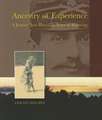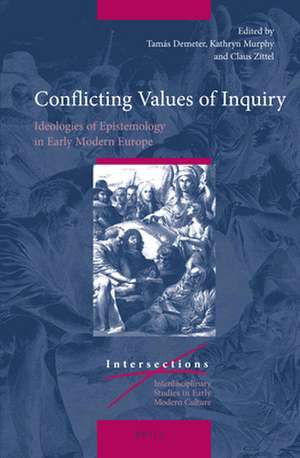Conflicting Values of Inquiry: Ideologies of Epistemology in Early Modern Europe: Intersections, cartea 37
Tamás Demeter, Kathryn Murphy, Claus Zittelen Limba Engleză Hardback – 27 noi 2014
Din seria Intersections
-
 Preț: 98.61 lei
Preț: 98.61 lei -
 Preț: 154.86 lei
Preț: 154.86 lei -
 Preț: 192.18 lei
Preț: 192.18 lei -
 Preț: 200.27 lei
Preț: 200.27 lei -
 Preț: 215.61 lei
Preț: 215.61 lei -
 Preț: 116.09 lei
Preț: 116.09 lei - 18%
 Preț: 1074.49 lei
Preț: 1074.49 lei -
 Preț: 241.64 lei
Preț: 241.64 lei -
 Preț: 241.64 lei
Preț: 241.64 lei -
 Preț: 228.96 lei
Preț: 228.96 lei -
 Preț: 226.67 lei
Preț: 226.67 lei -
 Preț: 229.55 lei
Preț: 229.55 lei -
 Preț: 241.64 lei
Preț: 241.64 lei -
 Preț: 107.21 lei
Preț: 107.21 lei -
 Preț: 208.79 lei
Preț: 208.79 lei -
 Preț: 201.78 lei
Preț: 201.78 lei -
 Preț: 226.85 lei
Preț: 226.85 lei -
 Preț: 225.71 lei
Preț: 225.71 lei -
 Preț: 246.63 lei
Preț: 246.63 lei -
 Preț: 247.40 lei
Preț: 247.40 lei -
 Preț: 228.96 lei
Preț: 228.96 lei - 47%
 Preț: 319.92 lei
Preț: 319.92 lei - 7%
 Preț: 315.66 lei
Preț: 315.66 lei -
 Preț: 96.10 lei
Preț: 96.10 lei - 18%
 Preț: 1201.75 lei
Preț: 1201.75 lei - 18%
 Preț: 659.72 lei
Preț: 659.72 lei - 18%
 Preț: 693.27 lei
Preț: 693.27 lei - 18%
 Preț: 1049.44 lei
Preț: 1049.44 lei - 18%
 Preț: 698.33 lei
Preț: 698.33 lei - 18%
 Preț: 682.00 lei
Preț: 682.00 lei - 18%
 Preț: 687.28 lei
Preț: 687.28 lei - 18%
 Preț: 820.61 lei
Preț: 820.61 lei - 18%
 Preț: 683.39 lei
Preț: 683.39 lei - 18%
 Preț: 667.87 lei
Preț: 667.87 lei
Preț: 818.42 lei
Preț vechi: 998.08 lei
-18% Nou
Puncte Express: 1228
Preț estimativ în valută:
156.65€ • 170.22$ • 131.67£
156.65€ • 170.22$ • 131.67£
Carte indisponibilă temporar
Doresc să fiu notificat când acest titlu va fi disponibil:
Se trimite...
Preluare comenzi: 021 569.72.76
Specificații
ISBN-13: 9789004281707
ISBN-10: 9004281703
Pagini: 410
Dimensiuni: 155 x 235 x 28 mm
Greutate: 0.77 kg
Editura: Brill
Colecția Brill
Seria Intersections
ISBN-10: 9004281703
Pagini: 410
Dimensiuni: 155 x 235 x 28 mm
Greutate: 0.77 kg
Editura: Brill
Colecția Brill
Seria Intersections
Cuprins
List of illustrations
Notes on Editors and Contributors
Acknowledgements
Values, Norms and Ideologies in Early Modern Inquiry: An Introduction
Tamás Demeter
Reason and Common Culture in Early-Modern Natural Philosophy: Variations on an Epistemic Theme
Peter Dear
Devices and Epistemic Values
Sixteenth-Century Hydraulic Engineers and the Emergence of Empiricism
Matteo Valleriani
Visual Perception and the Cartesian Concept of Mind: Descartes and the Camera Obscura
Daniel Schmal
The Epistemology of Testimony
Testimony and Empiricism: John Sergeant, John Locke, and the Social History of Truth
John Henry
Eight Days of Darkness in 1600: Hume on Whether Testimony Can Establish Miracles
Falk Wunderlich
Religion and Inquiry
Kepler’s Revolutionary Astronomy: Theological Unity as a Comprehensive View of the World
Giora Hon
Natural Theology as Superstition: David Hume and the Changing Ideology of Natural Inquiry
Tamás Demeter
The Problem of Parallels as a Protestant Issue in Eighteenth-Century Hungary
János Tanács
Values in Controversy
Newton’s Strategic Manoeuvring with Simple Colours and Diagrams: A Radical Historical Interpretation
Gábor Áron Zemplén
The Birth of Epistemological Controversy from the Spirit of Conflict Avoidance: Hobbes on Science and Geometry
Axel Gelfert
The Methods and Epistemic Virtues of a ‘Science of Man’
Analytic and Synthetic Method in the Human Sciences: A Hope that Failed
Thomas Sturm
The Science of Man and the Invention of Usable Traditions
Eric Schliesser
Ethics in Epistemology
Francis Bacon on Charity and the Ends of Knowledge
Sorana Corneanu
Spinoza’s Ethics: A Dominion within a Dominion
Ruth Lorand
What was Kant’s Critical Philosophy Critical of?
Catherine Wilson
Index
Notes on Editors and Contributors
Acknowledgements
Values, Norms and Ideologies in Early Modern Inquiry: An Introduction
Tamás Demeter
Reason and Common Culture in Early-Modern Natural Philosophy: Variations on an Epistemic Theme
Peter Dear
Devices and Epistemic Values
Sixteenth-Century Hydraulic Engineers and the Emergence of Empiricism
Matteo Valleriani
Visual Perception and the Cartesian Concept of Mind: Descartes and the Camera Obscura
Daniel Schmal
The Epistemology of Testimony
Testimony and Empiricism: John Sergeant, John Locke, and the Social History of Truth
John Henry
Eight Days of Darkness in 1600: Hume on Whether Testimony Can Establish Miracles
Falk Wunderlich
Religion and Inquiry
Kepler’s Revolutionary Astronomy: Theological Unity as a Comprehensive View of the World
Giora Hon
Natural Theology as Superstition: David Hume and the Changing Ideology of Natural Inquiry
Tamás Demeter
The Problem of Parallels as a Protestant Issue in Eighteenth-Century Hungary
János Tanács
Values in Controversy
Newton’s Strategic Manoeuvring with Simple Colours and Diagrams: A Radical Historical Interpretation
Gábor Áron Zemplén
The Birth of Epistemological Controversy from the Spirit of Conflict Avoidance: Hobbes on Science and Geometry
Axel Gelfert
The Methods and Epistemic Virtues of a ‘Science of Man’
Analytic and Synthetic Method in the Human Sciences: A Hope that Failed
Thomas Sturm
The Science of Man and the Invention of Usable Traditions
Eric Schliesser
Ethics in Epistemology
Francis Bacon on Charity and the Ends of Knowledge
Sorana Corneanu
Spinoza’s Ethics: A Dominion within a Dominion
Ruth Lorand
What was Kant’s Critical Philosophy Critical of?
Catherine Wilson
Index
Notă biografică
Tamás Demeter is Research Group Leader at the Institute of Philosophy, Hungarian Academy of Sciences and teaches at the University of Pécs, Hungary. He received his PhD from the University of Cambridge and has published widely on the connections of early modern natural and moral philosophies.
Kathryn Murphy, D.Phil. (2009), is Fellow and Tutor in English Literature at Oriel College, Oxford. Her research focuses on early modern English prose, discourses of knowledge, and the reception of ancient philosophy.
Claus Zittel teaches German literature and philosophy at the Universities of Stuttgart, Frankfurt am Main, and Olsztyn (Poland), and is deputy director of the Stuttgart Research Centre for Text Studies. He has published monographs, editions and many articles on Early Modern Philosophy and Literature and Philosophy, including The Artist as Reader (Brill 2013).
Kathryn Murphy, D.Phil. (2009), is Fellow and Tutor in English Literature at Oriel College, Oxford. Her research focuses on early modern English prose, discourses of knowledge, and the reception of ancient philosophy.
Claus Zittel teaches German literature and philosophy at the Universities of Stuttgart, Frankfurt am Main, and Olsztyn (Poland), and is deputy director of the Stuttgart Research Centre for Text Studies. He has published monographs, editions and many articles on Early Modern Philosophy and Literature and Philosophy, including The Artist as Reader (Brill 2013).
Recenzii
“this book is indispensable not only for those who want to know the intellectual panorama of the time, but also for those who want to understand the basis of rationality and historicity that constitutes epistemological thinking associated with ethical-moral development at the dawn of modernity."
Luiz C. Bombassaro, Universidade Federal do Rio Grande do Sul. In: Renaissance Quarterly, Vol. 69, No. 4 (Winter 2016), pp. 1470-1471.
Luiz C. Bombassaro, Universidade Federal do Rio Grande do Sul. In: Renaissance Quarterly, Vol. 69, No. 4 (Winter 2016), pp. 1470-1471.
